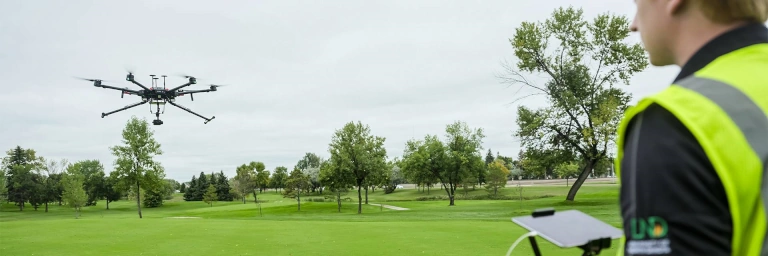
UAS
UND Aerospace's Unmanned Aircraft Systems Operations curriculum provides the breadth and depth of education needed to ensure graduates are prepared to work as effective operational team members of unmanned aircraft systems (UAS), while fully understanding the operational and safety environments of the National Airspace System.
The UAS program offers two career tracks within the UAS Operations major, to specialize in 1) advanced high-altitude, autonomous commercial systems, or 2) the emerging and dynamic small UAS market. Non-aviation majors also have the opportunity to obtain a minor in UAS to use in their particular discipline.





The comprehensive UAS Operations degree includes relevant topics such as human factors, crew resource management, autonomous systems, counter UAS applications, experience in various UAS platforms and simulators, safety management, aerodynamics, and UAS ground and flight systems.
As some of the technologies involved with UAS fall under International Traffic in Arms Regulations, students wishing to pursue this degree program must be able to provide United States citizenship.
Mission
The mission of the Department of Aviation's Undergraduate Program in Unmanned Aircraft Systems Operations is to provide educational opportunities for students that will develop individuals who possess excellent aviation technical abilities, superior communication and teamwork skills, are adaptable to change, seek life-long learning, can effectively utilize technology, and have an appreciation of other cultures in order to ensure successful contributions in the global and dynamic aviation industry. Graduates will develop an understanding of the operational and safety environment of the National Airspace System. This program will prepare graduates in seeking employment in the aviation industry as UAS operator.
Program Outcomes
- Be able to demonstrate crew performance and coordination in UAS operational environments while applying problem-solving skills, and an in-depth understanding of the operational, regulatory, and safety environment of the National Airspace System
- Be able to demonstrate UAS airmanship commensurate with a Commercial Pilot Certificate with Instrument Rating
- Demonstrate an understanding of the science, technology, engineering, and mathematics principles common to UAS operations
- Develop a working knowledge of UAS technologies and their application in governmental and civil operations
- Be able to demonstrate knowledge of legal, ethical, and moral issues related to UAS operations
- Be familiar with computer technologies and processes associated with UAS operations to include programming, data storage and security, and networking
- Be able to apply management skills to programs and projects in an emerging UAS industry